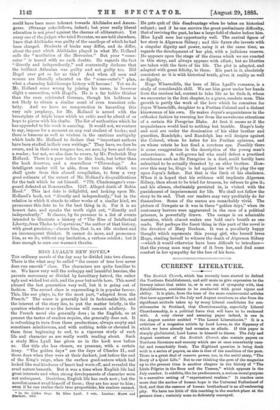MISS LYALL'S NEW NOVEL.*
THE ordinary novels of the day may be divided into two classes. There is the what may be called " the course of true love never does run smooth" class. The characters are quite familiar to us. We know very well the unhappy and beautiful heroine, the parents mercenary or divided by hereditary hatred, the suitor ugly and wicked but rich, and the poor but noble hero. This novel pleased the last generation very well, but it is going out of fashion. The second class is superseding it in popular favour. This, like our plays, is, for the most part, "adapted from the French." The scene is generally laid in fashionable life, and the interest of the story lies, to put the matter briefly, in the question whether or no the heroine will commit adultery. In the French novel she generally does ; in the English, so at present the tastes of readers require, she generally does not. It is refreshing to turn from these productions, always empty end sometimes mischievous, and with nothing noble or elevated in them from beginning to end, to a vigorous study of such life and character as are really worth reading about. Such a study Miss Lyall has given us in the book now before us. Her title she has chosen, we presume, with a certain irony. "The golden days" are the days of Charles II., and those days when they were at their darkest, just before the end of the King's reign, when the surface good-nature which had looked like real kindness of heart had worn off, and revealed the cruel nature beneath. But it was a time when English life had great interests and when strong developments of character were not unfrequent. Doubtless, English life has such now ; but the novelist cannot avail himself of them ; they are too near tolim; even if he can realise their true proportions, his readers cannot.
* In the Golden Days. By Edna Lyall. 3 vols. London Hurst and Blackett. 18E5. He gets quit of this disadvantage when he takes an historical subject ; and if he can survive the great preliminary difficulty, that of reviving the past, he has a large field of choice before him. Miss Lyall uses her opportunity well. The central figure of her story is Algernon Sidney ; and this figure she invests with a singular dignity and power, using it at the same time, as regards the development of her plot, with a judicious reserve. He appears upon the stage of the drama which we see enacted in this story, and always appears with effect; but no liberties are taken with the facts of his life. The plot is adapted, and adapted with great felicity, to them. His part in it, absolutely consistent as it is with historical truth, gives it reality as well as dignity.
Hugo Wharncliffe, the hero of Miss Lyall's romance, is a study of considerable skill. We see him grow under her hands from the careless lad, content to take life as he finds it, whom we encounter in the first chapter, to a grave, resolute man. This growth is partly the work of the love which he conceives for Joyce Wharncliffe, daughter to a Puritan Colonel and a distant kinswoman of his own. He makes Joyce's acquaintance in the orthodox fashion by rescuing her from the unwelcome attentions of a certain Sir Peregrine Blake. At first it seems as if the acquaintance would lead to nothing but trouble. Hugo's body and soul are under the domination of his elder brother and guardian, Randolph ; and Randolph has evil designs against the Colonel, whom he hates for his Puritan opinions, and on whose estate he has fixed a covetous eye. Possibly there is some exaggeration in the description of the young man's subservience. A well-grown lad who could defeat a practised swordsman such as Sir Peregrine in a duel, could hardly have submitted to be actually thrashed by an elder brother. How- ever this may be, Hugo is led against his will to play the spy upon Joyce's father. But that is the limit of his obedience. When it is hoped that his evidence will implicate Algernon Sidney, then about to be tried for treason, he refuses to give it; and his silence, obstinately persisted in, is visited with the punishment of imprisonment for life. We shall not follow the story to its end. That our readers may very profitably do for themselves. Some of the scenes are remarkably vivid. The picture of Newgate as it was in these " golden days," when its customary horrors were aggravated in the case of a political prisoner, is powerfully drawn. The escape is an admirable narrative, which almost makes one hold one's breath as one reads. But perhaps the finest thing in this part of the novel is the devotion of Mary Denham. It was a peculiarly happy thought which represents this young girl, who herself loves Hugo, steeling herself to witness the death of Algernon Sidney —which it would otherwise have been difficult to introduce— that the young man may hear of it from her, and find some comfort in her sympathy for the loss of his hero.


































 Previous page
Previous page